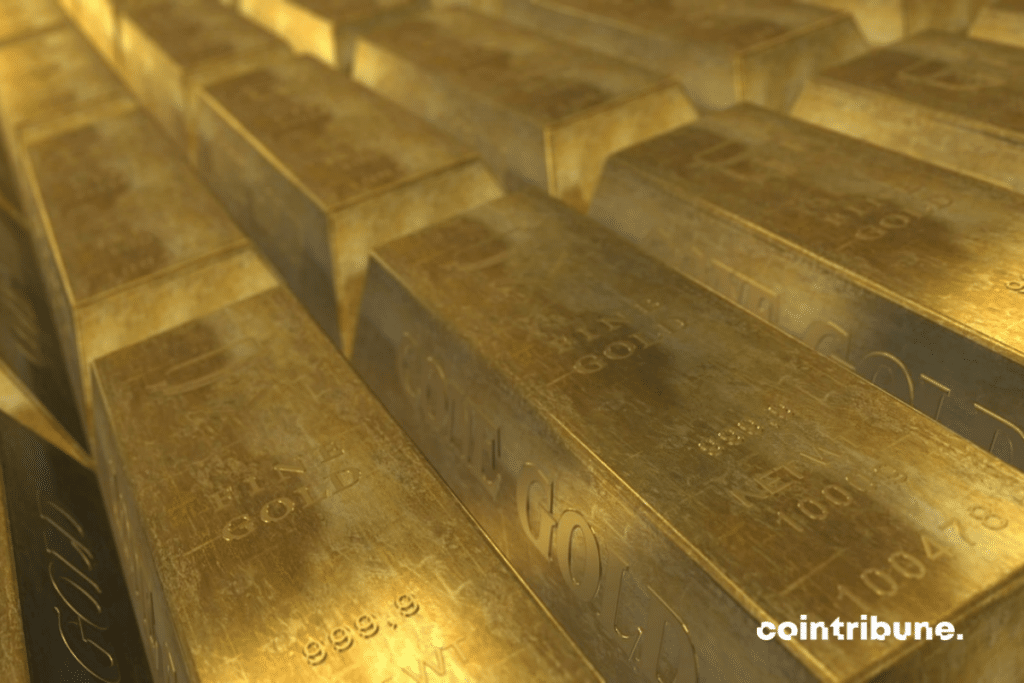So it begins.. pic.twitter.com/ZmsrU4OvCS
— Nicolas Teterel (@NTeterel) July 3, 2023
A
A
Central banks hoard gold
Wed 12 Jul 2023 ▪
6
min read ▪ by
Getting informed
▪
Invest
Central banks continue to accumulate gold. Geopolitics and inflation redefine the rules of the game.

Gold rush
Invesco’s annual survey of central banks and sovereign wealth funds shows that a growing number of countries are repatriating their gold reserves to avoid suffering Russia’s fate.
For Invesco, sovereign fund managers are “fundamentally” rethinking their strategies. Many are convinced that rising inflation and geopolitical tensions are here to stay.
Over 85% of 85 SWFs and 57 central banks believe that inflation will be higher in the next decade than in the last.
Former IMF chief economist Olivier Blanchard argues that central banks should raise their inflation target from 2% to 3%:
The seizure of the equivalent of $300 billion in reserves belonging to Russia is largely responsible for this renewed appetite for gold.
The survey shows that a “substantial proportion” of central banks are concerned about this precedent. Almost 60% of respondents believe that the freezing of Russian reserves makes gold more attractive.
One central bank (Bundesbank?) said on condition of anonymity: “We used to have gold in London… but now we’ve transferred it to our own country to keep it safe”.
This year, 68% of central banks kept their gold reserves in their own countries, compared with 50% three years earlier.
Incidentally, Invesco is one of several funds wishing to launch a Bitcoin ETF still blocked by the SEC. The fund is well placed to know that the bullish potential is immense if the world really were to change its international reserve currency…
Geopolitics
Geopolitical tensions combined with the opportunities offered by China are also encouraging some central banks to turn away from the dollar.
Moreover, over 7% of central banks believe that rising US debt is also a negative factor for the greenback.
One only has to look at the curve of interest payments on US debt to wonder. We’re approaching $1,000 billion a year:
As the US government has no intention of tightening its belt, indebtedness is set to worsen. A bad omen for inflation.
That said, most central banks still see no alternative to the dollar as a reserve currency. Only 18% of those who see the Chinese yuan as a competitor do so, compared with 29% last year!
Put another way, China has no intention of letting foreign central banks invest in its debt. The result would be an appreciation of the yuan that would be detrimental to industry, exports and employment.
Overall, almost 80% of the 142 institutions surveyed see geopolitical tensions as the main risk for the next decade. Over 80% are worried about inflation in the coming year.
These concerns are linked to the proxi war waged by the United States against the spearhead of de-dollarization: Moscow.
Bis repetita. For the dollar, for the empire!
Former Prime Minister Dominique de Villepin declared this weekend on France Inter:
“Russia has a large number of the world’s peoples on its side […]. What is the lesson of Iraq? […] We didn’t want to push through the UN inspections with Saddam Hussein (an odious character), and we reaped the rewards of chaos and terrorism. At a certain point, we didn’t want to push things too far with Gaddafi’s Libya, and we reaped the rewards of chaos and the situation in the Sahel. So we need to learn the lessons of history.”
The BRICS‘ initiative for a new gold-backed currency could jeopardize the dollar, the euro, and so on. The result would be massive inflation and exploding debt.
Let’s not forget that, after the end of the gold standard decreed by Nixon in 1971, H. Kissinger set up the petrodollar system. The dollar was no longer backed by gold, but by oil. Subsequently, all those who tried to do without the dollar ended up very badly.
Saddam Hussein was overthrown just two years after ceasing to denominate his oil in dollars. Muammar Gaddafi, whose ambition was to create a pan-African currency based on gold, was assassinated during his term at the head of the African Union…
Today, others have taken up the torch. This Monday, at the end of the sixth round of strategic dialogues between Russia and the Gulf Cooperation Council, the Russian Foreign Minister hammered home:
“The dollar has proved its unreliability and has seriously discredited itself as the main reserve currency…”
A return to the gold standard is in the pipeline. The fact that Saudi Arabia has already promised to accept the yuan (convertible into gold) for its oil is a strong sign.
Hence the gesticulations of the empire, which will do everything in its power to exchange paper for energy for a few more decades.
Protect yourself against the ravages of history. Bitcoin, not gold…
Maximize your Cointribune experience with our "Read to Earn" program! For every article you read, earn points and access exclusive rewards. Sign up now and start earning benefits.
A
A
Bitcoin, geopolitical, economic and energy journalist.
DISCLAIMER
The views, thoughts, and opinions expressed in this article belong solely to the author, and should not be taken as investment advice. Do your own research before taking any investment decisions.